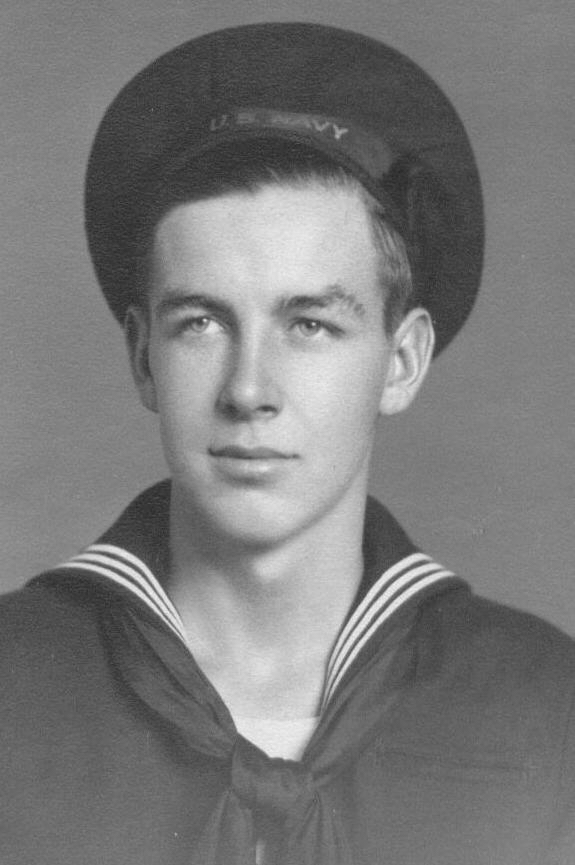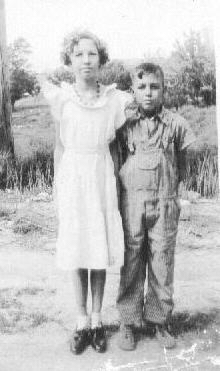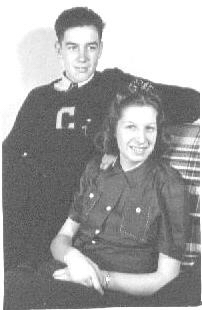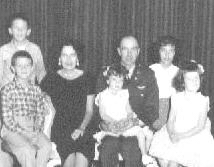Lt. Col. Clarence William Smith (ret)



In 1937 at the age of 12, The Smith family moved to Coquille, Oregon. Clarence William Smith graduated from high school in May 1942. That same year in September, he enlisted in the United States Navy, at the age of 17.

In 1945 he met his first wife, Hazel Francis Eno. They were married July 4th of that year. In November 1945 he left the Navy and moved to Oregon. Clarence William Smith did odd jobs and enlisted in the Army Reserve for the next 5 years. In 1950 Clarence William Smith joined the United States Army active duty until he retired September 1, 1968. Clarence William Smith went to work for Westing House until he retired from there. He then bought 154 acres in Duval County and started the Circle S Ranch. Clarence William Smith has 5 children.

He was married to Hazel Smith for just over 50 years until the battle with cancer ended her life. He is a Christian who attended Catholic churches until marrying his second wife, Barbara Claudine Crow (Manon) about 6 Ĺ years ago. He is now a member of Gardendale Baptist Church. Clarence William Smith enjoys playing golf and Country Western Dancing. Lt. Col. Clarence William Smith (ret) is my grandfather from my motherís side of the family. I will focus my interview on his life during World War II and just after the War. Clarence William Smith is a conservative Republican living in a middle class neighborhood in Corpus Christi, Texas. This interview took place in his kitchen at his home on Quincy drive in Corpus Christi, Texas on a Saturday evening.
What was the means of finding out about what was going on during World War II before you entered the Navy?
Radio and newspapers was all there was. There was no other form of communications.
Was there television?
No Television.
What was the radio and newspapers saying about the war during World War II?
It was a very dastardly act that happened to us that got us into the war by Japan. It was totally unthought of that anyone would have the audacity to attack this country like that. And of course they did as we all know on December 7th, 1941 and that was the start of a great world war which World War I was faught to end all wars and here we are in 1941 we're in another war in which the whole world was at war. You either had Japanese, Italians and Germans on one side and you had the United States, Great Britian, France and Russia on the other side fighting to stop the occupation of all of Europe by the Nazis, by Hitler.
What was your reaction when you found out about Pearl Harbor?
Total disbelief. My mother, my father and a girlfriend of mine had taken a drive down to Port Orford, Oregon. There was a lumber skooner that had run aground and that of course was a big thing to see so we we wanted to go down and see this ship that had run aground, well we didn't know why all of the sudden the radio went dead. We couldn't get anything anywhere. So when we got back and I pulled up to my girlfriend's house to let her off, her mother came running out and told us that Pearl Harbor had been bombed. It was just total disbelief. It was, you could not imagine. That's about all I could tell on that point, your in shock.
What was the sentiment before Pearl Harbor as far as the war going on in Europe? Did people want to get involved or did they much care?
There were some people who did go ahead and volunteer, particually pilots who volunteered to fly for England before the United States got into it. There were a few soldiers who went and joined the British and Canadian Armies and went to fight. It was pretty much a known fact that unless the peace accord that Chamberland was trying to work out was successful, that there was no way that you were going to stop it and then we were going to be in a war. When Japan attacked Pearl Harbor that was it ans everybody knew we were definitly going to fight a war.
Why did you enlist in The United States Navy?
I graduated from High School in 1942 and at that time anyone who was 18 years old or older would automatically be drafted. I decided at that point in time I would go into the Navy instead of the Army. So just prior to my 18th birthday I enlisted in the Navy. Now I had to have my parents consent because I wasn't 18 and I couldn't sign up by myself.
How long was boot camp?
Boot camp was 16 weeks long.
Where did you go for boot camp?
I went to boot camp in San Diego, California US Naval Training Center in San Diego, California.
What was boot camp like?
Well you learn lots about KP. You learn lots about cleaning latrins or as they are called in the Navy, Heads. You learn a lot of good housekeeping because you had to to take care of all your own clothes. So it was quiet an indoctranation. I believe even today it would be a good if we still had the draft and a lot of these young people had to go and serve at least two years in the military because it really teaches them dicipline and how to take orders, which is something that seems to be lacking.
While you were in the Navy, what was your first assignment?
Well my first assignment was after I got out of boot camp. I was sent to Purdue University, West Layfette, Indiana in which they gave us a 2 year Electrical Engineering course in 16 weeks and if you passed that course you graduated from there as a Petty Officer 3rd class, which would be equal to a Sergeant in the Army. Fortunately I was lucky enough I passed and that was my first assignment after boot camp. From there I was sent to Treasure Island in San Francisco, California and there I was assigned to a mine sweeper. I spent all of World War II on mine sweepers.
During the war, what were your duties?
I was an Electrians Mate on a mine sweeper. I had to keep all the refidgeration units running so we would have food, water pumps, all different types of motors and stuff, check out any electrical problems and repair them. Anything to do with electricity.
Where there any specific ship names?
Gosh I can't remember that for what they were anymore.
While you were in the Navy, how did you receive information on the war?
We had radio. We could get it from the radio and of course you had radio stations that you could listen to from all over the world. Of course some of the short wave stuff we could pick up Tokyo Rose and listen to how bad we were doing.
Who was Tokyo Rose?
She was actually an American girl that went back to Japan and she was a propaganda specialist for the Japanses.
During this time Japanese Americans were picked up and moved. What do you know about that?
Well I guess at that time I felt it was probably the right thing to do. Now I'm sure it was not. Again it goes back to and it's in history and everybody knows that the most decorated unit in the United States Army was a Japanese American Nisei unit out of Hawaii. They fought in the European Campaign. They had more decorations and more decorated people in that battalion than in any other battalion in history of the Army. I'm sure it was wrong , but at the time we thought it was right because we didn't know having been at peace from 1918 to 1941 this country never even gave war a thought. So of course the first thing that pops up in your mind well do I have agents and saboteurs, all this espionage people so the surest way not to have this was put them behind barbed wire, which we did.
What did people know about Hilter during the war?
Well they first new Hitler was a maniac. He was really, Hitler thought he was he was a supreame being. His whole philosophy was that they were going to make a super race. They would annihilate all others than pure blooded German people and that was why he, I believe as I recall going back and thinking about the history, there was something like 6 million Jews thats he exterminated in concentration camps. These are very gruesome places. I did, I have seen some of it because in 1952 I served a 3 year tour over there. This was part, still at that time still considered as occupation force. Of course these concentration camps were all around and you could still visit them. It was gruesome.
When did you find out about the concentration camps in Germany?
We knew about that during the war because that came out and everybody just knew it was a genicide type of thing. That probably helped us fight a little harder even in the Pacific fighting the Japanese which they were about as cruel as the Germans.
During the war, were there any anti-war demonstartions?
There were no demonstations that I heard of.
Where there any consciences observers?
There were some consciences observers which we have those in every engagement we have ever been in. Well as a matter of fact, there is a group of people, the Quakers that flat do not believe in any shape or form of war. They don't believe in any violence at all. I think they call them Quakers.
How did the civilian population act towards the military during World War II?
We were heros. You were heros because it was just about a known fact if Japan had wanted to, after Pearl Harbor, there wasn't much left between there and the West Coast of the United States. They probably could have, if they had followed up on it, have invaded the West Coast of the United States. There would have been nothing to stop them short of the Rocky Mountains.
After the war how were veterans treated?
We were treated real good. Even today your World War II veterans are classified as saviors of the country. There is nothing what's so ever detrimental said about the World War II people.
After the war why did you get out of the military?
Well I got married and the Navy would send you for a tour aboard a ship and as a matter of fact when the war ended, I was at the destroyer base in San Diego, California and I was working in the electrical motor shop. We had just finished overhauling a destoyer. We called it the "Tin Can" and that "Tin Can" was being sent to China for two years. I didn't think I wanted to go. I had spend all of World War II on salt water and I didn't think I needed anymore and I got out and went back to Oregon where I was from and got into a little inactive Army Reserve unit and worked in that for awhile and then it got to where it was a little tuff to find jobs after the war and with a family to support. I said well I think I know where I can find a job so I went down and enlisted in the regular Army.
Well first of all I learned some computer programs and second how to scan down a picture. I knew that my Grandfather was in World War II, but I had know idea what he did as a trade in the Navy. I didn't know that he had married my Grandmother during World War II. I had heard stories about how they had met, but didn't know when they had married.
I didn't know my Grandfather didn't have television when he was growing up. I realized that my Grandfather has really seen dramatic changes with technology in his lifetime. Not part of this assignment, but I also learned more about my Uncle, Daniel Smith, who was listed as missing in action from the Viet Nam War.
Well I have always been proud of my Grandfather. He has always been the person I looked up to the most in my family. I didn't realize how much people during that time sacrificed without giving it a second thought. Everyone wanted to do something to contribute to this great country.
The benifits of learning about about the past through oral history is being able to get a view of history not taught in history books first hand from the perspective of the person you interviewed. The drawbacks of oral history in this case is bringing up memories of the past that some might want to forget.
I believe this in an effective way of learning about the past. I as the interviewer got a hands on type feeling about what it was like living through the World War II. I was able to visiualize with the descriptions and pictures that my Grandfather shared with me during this interview. I would hope that all the History classes would have an assignment like this. The more we can learn about history and retain it, the more we will, as a nation, learn from our mistakes.
Lebanon, Kansas. Welcome to Key to the City's page for Lebanon Kansas. http://www.pe.net/~rksnow/kscountylebanon.htm (2003). This web site tells of some statistics and facts of Lebanon, Kansas.
Pearl Harbor. Pearl Harbor: Remembered. http://my.execpc.com/~dschaaf/mainmenu.html (2003). This web site was created to honor the both the survivors and those who died during the attack on Pearl Harbor.
US Naval Training Centerin San Diego, California. Southwest Division Naval Facilities Engineering Command. http://www.efdsw.navfac.navy.mil/Environmental/NTCSD.htm (2003). This web site is set up by the United States Navy. It gives some history of the Naval Training center along with updates.
Purdue University. Purdue University Electrical & Computer Engineering. https://engineering.purdue.edu/ECE/ (2003). This is a web site for Purdue University. It gives information from Alumni Information to course study.
Smith, David T. Treasure Island. Treasure Island. http://sfphototour.tripod.com/treasure.html (2003). This web site is a photo tour of Treasure Island and the San Fransciso area complete with music.
Tokyo Rose. "TOKYO ROSE" famous cases. http://www.fbi.gov/libref/historic/famcases/rose/rose.htm (2003). This is a FBI web site telling the history of who Tokyo Rose was and a history of life before, during and after World War II.
Missing in action. DPMO Defense Prisoner of War/Missing Personnel Office. http://www.dtic.mil/dpmo/ (2003). This is a Department of Defense web site set up to assist the families of Americans who are either a Prisoner of War or Missing in Action, find information the families may be looking for.
Japanese American Nisei unit. JAVA, Japanese-American Veterans Association. http://www.javadc.org/Index1.htm (2003). This is an umbrella website representing a number of Japanese-American Veterans' organizations.